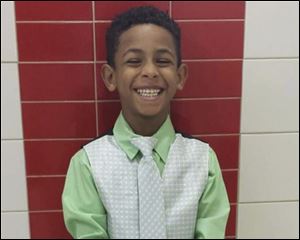
FEATURED EDITORIAL
Hear children’s own voices
5/20/2017“I am my son’s voice, and it will be heard,” proclaims Gabriel Taye’s mother.
The question that should haunt us — and it should be part of the investigation — is: When Gabriel was still alive, where was his own voice?

Taye
Gabriel Taye was 8 years old when he ended his life. He’d been brutally bullied at his Cincinnati school, and his mother took him to a hospital because he was vomiting.
Click here to view more Blade editorials
The hospital thought he had stomach flu. So after one day’s respite, he was sent back to the same school. He came home and hanged himself.
His mother, Cornelia Reynolds, complains that school officials didn’t tell her about the violence he’d endured. If so, nothing excuses the school officials. But that still leaves the big questions about Gabriel’s own voice, whether he used it, and whether it was ignored.
Did Gabriel tell his mother what happened? If not, why not? Did he think she wouldn’t take it seriously? Did he think there’d be nothing she could do based on what he said?
Did Gabriel, when he got to the hospital, volunteer that he had been attacked? Was he asked whether anything had happened that might have caused an injury, or were the questions addressed to his mother?
Some will hesitate to challenge a grieving mother who may turn out to be entirely blameless. But the questions must be asked. Because either Gabriel spoke, or he didn’t. Either his voice went unheard, or he didn’t think it was worth speaking.
How sure does a boy have to be that no one will care what he says to kill himself without trying to be heard?
Yet how often do adults show children that what they say matters? If Gabriel was afraid to go back to school, what reason did he have to think that saying so would make a difference?
To protect the children who are still here, adults must prove to them that their voices will be heard. That means encouraging them to speak up when they need help. But it also means taking them seriously when they do speak up. Whatever they’re upset about matters to them, so it should matter to those who care about them. And that’s how adults can show that their future concerns will also be taken seriously — so that when something terrible happens, they see a point to coming forward.
Gabriel’s voice is gone forever. But the voices of other children can still be heard, and their lives may be saved if adults listen.